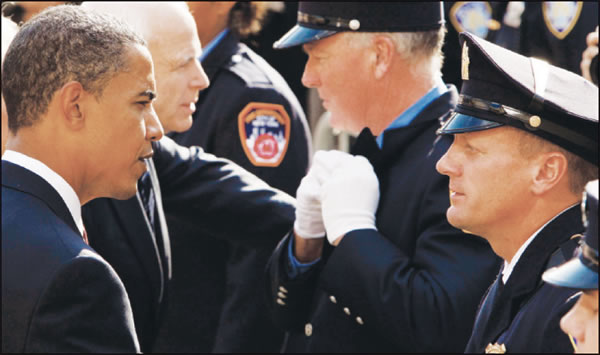By Julie Shapiro
President Barack Obama inched back toward neutral ground on the 9/11 health bill Wednesday, but he still would not commit to supporting it.
The Obama administration’s opposition of the bill last week and Obama’s vague comments Wednesday came in stark contrast to a promise his campaign made to Downtown Express in 2008.
One month before Obama was elected, Blake Zeff, Obama’s New York communications director, told Downtown Express unequivocally that Obama supported the House of Representatives’ 9/11 health bill.
“Yes, Obama does support the bill,” Zeff wrote in an e-mail on Oct. 2, 2008. Downtown Express was the first and likely the only news organization to report on Obama’s position before the election.
The bills now under consideration in the House and Senate are slightly different than the ’08 version, but the fundamentals are the same.
Since ’08, Obama had not said much publicly about the $11 billion bill. Conventional wisdom was that Obama would not move on the 9/11 health bill until he got his broader healthcare bill passed, but local elected officials did not doubt Obama’s support.
But then last Thursday, Health and Human Services Secretary Kathleen Sebelius surprised New York’s Congressional delegation by saying that the administration would not back the 9/11 health bill because it has an open-ended funding mechanism, promising to meet the needs of all those who are sick. The bill would reopen the 9/11 victims’ compensation fund, providing free healthcare to first responders and Lower Manhattan residents, students and office workers who can demonstrate that their illnesses were caused by their exposure to toxic chemicals and dust on 9/11. The ’08 version of the bill, which Obama supported during the campaign, had the same funding mechanism as the current bill.
New York’s delegation, including Sens. Charles Schumer and Kirsten Gillibrand and Reps. Carolyn Maloney and Jerrold Nadler, criticized the Obama administration for reversing its position on the bill, and local community health activists followed suit.
“The take-away message is: If there’s a terrorist attack in your neighborhood…you will not be taken care of,” said Catherine McVay Hughes, vice chairperson of Community Board 1.
“It sent a shockwave through all of the groups working on this issue,” added Kimberly Flynn, head of 9/11 Environmental Action. “People are feeling totally betrayed.”
Obama quickly stepped in and doubled next year’s federal allocation for 9/11 health to $150 million, but Hughes and others said the funding boost was not enough. The health advocates want a guaranteed stream of money for those who are sick, so they do not have to fight for funding every year and gamble on a sympathetic Congress and president.
On Wednesday, Gillibrand took the opportunity to directly question Obama about the health bill when he met with Democratic senators.
Obama replied that he was committed to working with Gillibrand on the 9/11 health issues.
“I’m not just talking the talk,” Obama said, according to a White House transcript. “We’ve been budgeting this as a top priority for the administration.”
However, Obama also confessed that he had not read the legislation, and it was not clear whether his comments referred only to first responders or to Lower Manhattan residents, students and office workers as well.
Obama has taken a personal role in Gillibrand’s reelection campaign, persuading at least one potential Democratic primary opponent not to join the race. Gillibrand did not press Obama on the 9/11 health bill after his general response, according to the transcript.
Moira Mack, a White House spokesperson, added in an e-mailed statement to Downtown Express that the president “remains fully committed to ensuring that our rescue and recovery workers, residents, students and others suffering the health consequences related to the World Trade Center disaster get the health care and monitoring they need.”
Before the 9/11 health issues sprang back into the limelight last Thurs., Jan. 28, local activists met with Maloney’s staff on Jan. 27. They were concerned that the community portion of the health bill could disappear during negotiations.
“Nine-eleven was like a war, and I look at the whole community like victims of war that have to be protected,” said Marilena Christodoulou, who was president of Stuyvesant High School’s parent association on 9/11. Christodoulou told Maloney’s office that many children developed respiratory problems when Stuyvesant reopened in October 2001, with the fires at ground zero still burning. She said about a dozen former Stuyvesant students and teachers now have cancer.
Spokespersons for Maloney and Nadler said this week that the Congressmembers would fight for the community allocations to stay in the bill. But some activists are still worried, especially after Maloney issued a statement this week that referred only to first responders.
The absence of guaranteed federal funding can be a problem for the groups that rely on that money to treat 9/11 patients.
“It makes everything more of a challenge,” said Terry Miles, executive director of the W.T.C. Environmental Health Center.
Without a steady funding stream, it is harder to attract and retain staff, he said. The center, based at Bellevue Hospital with two satellites, has treated 4,500 residents, students and office workers, many of whom have respiratory illnesses.
Miles was glad Obama had allocated $150 million to 9/11 health for 2011, though he was not sure how much the Bellevue program could receive. He was also glad to hear of Obama’s more neutral comments on the 9/11 health legislation on Wednesday.
“This is one more reason to feel encouraged,” he said.
Julie@DowntownExpress.com































